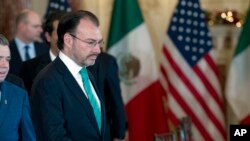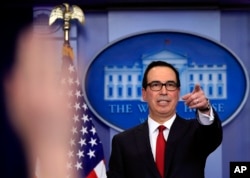Top U.S. and Mexican officials on Thursday expressed cautious optimism that the North American Free Trade Agreement will be renegotiated, speaking ahead of the next round of trade talks later this month.
Asked on local television whether it was more likely the $1.2 trillion trilateral trade pact would survive or die, Mexico's Foreign Minister Luis Videgaray said there was cause for optimism, though Mexico should be prepared for all eventualities.
"We should be prepared for a future with or without NAFTA," he said.
In Washington, U.S. Treasury Secretary Steven Mnuchin said it was a priority for the Trump administration to renegotiate NAFTA, declining to speculate on the consequences if the United States withdraws from talks.
The seventh round of negotiations in Mexico City will take place Feb. 25 to March 5, starting and ending a day earlier than initially planned.
There is a "window of opportunity" for concluding the talks in March or April, said Moises Kalach, head of the international negotiating arm of Mexico's CCE business lobby.
"That's the objective," Kalach told reporters.
Talks to renegotiate the 1994 pact have stalled as Canada and Mexico are at loggerheads with the United States over some of the most contentious proposals its negotiators have put on the table.
"I am cautiously hopeful that [U.S. Trade Representative] Ambassador Lighthizer will be renegotiating this deal," Mnuchin told the House Ways and Means Committee, which has jurisdiction over trade matters in the U.S. Congress.
"It is a major priority of ours," he added U.S. President Donald Trump has called NAFTA one of the worst deals in history, blaming it for U.S. manufacturing job losses, and has threatened to quit the agreement unless he can rework it to better suit U.S. interests. His remarks have unsettled financial markets.
At the last round in Montreal, Canada made several proposals to address the U.S. insistence on raising the North American content of autos. Washington also wants a clause that would allow any member to withdraw after five years.
The early March deadline for concluding talks has been extended to at least early April, officials have said. But participants have conceded privately it could take months longer.
If talks run past Mexico's July presidential election, Mexico's private sector will work with the president-elect to update NAFTA, Kalach said.
The current frontrunner, leftist contender Andres Manuel Lopez Obrador, has said Mexico should suspend talks until after the election.






